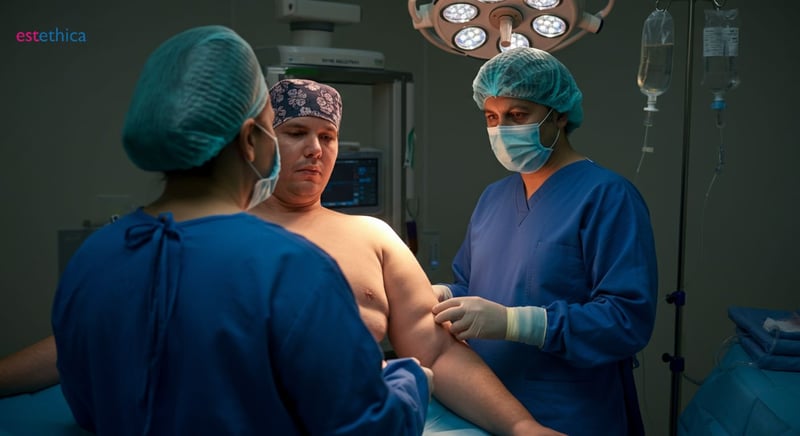Unlocking the Secrets of Stomach Surgery: Essential Insights
Discover all you need to know about stomach surgery: the procedures, safety, and recovery insights.
Stomach surgery, a critical medical procedure, is often the last resort for individuals seeking significant weight loss and health improvement. Known by various names such as gastric surgery, bariatric surgery, and more, this surgery aids in weight management and alleviating related health problems. Understanding the workings, safety considerations, and recovery tips are essential for anyone considering this life-altering procedure. In this comprehensive guide, we delve into each aspect of stomach surgery to provide a clear understanding to prospective patients.
What is Stomach Surgery and Who Needs It?
Understanding the Need for Stomach Surgery
Stomach surgery, also known as gastric surgery, is a medical intervention designed to aid individuals struggling with severe obesity. This procedure is often considered when traditional methods like diet and exercise have not yielded significant results. It is not merely about weight reduction but also addresses critical health issues such as diabetes and hypertension, which are often associated with obesity.
Key Benefits of Gastric Surgery
- Significant weight loss, leading to improved mobility and quality of life.
- Reduction in obesity-related health conditions, such as type 2 diabetes and high blood pressure.
- Enhanced psychological well-being due to improved self-image and confidence.
These benefits highlight why gastric surgery is a viable option for those who have not found success with other weight loss methods.
The Gastric Surgery Process
- Initial consultation and assessment to determine eligibility and discuss potential outcomes.
- Pre-surgery preparation, including dietary adjustments and psychological evaluations.
- Post-surgery recovery and lifestyle changes to maintain weight loss and health improvements.
Each step is crucial to ensure the surgery's success and the patient's long-term health benefits.

How Gastric Surgery Works: A Step-by-Step Guide
Understanding the Techniques of Gastric Surgery
Gastric surgery, also known as bariatric surgery, involves various techniques to aid in weight loss by altering the digestive system. One common method is the gastric bypass, where the stomach is divided into a small upper pouch and a larger lower section, and the small intestine is rearranged to connect to both. This reduces the stomach's capacity, limiting food intake and nutrient absorption.
Step-by-Step Gastric Surgery Procedure
- Pre-operative assessment to evaluate the patient's health and suitability for surgery.
- Surgical intervention, where the chosen technique is applied to modify the stomach and digestive tract.
- Post-operative care, focusing on recovery, dietary adjustments, and lifestyle changes.
Each step is meticulously planned to ensure the patient's safety and the surgery's effectiveness in achieving long-term weight loss.
Benefits and Considerations of Gastric Surgery
- Significant weight loss, often leading to the resolution of obesity-related conditions.
- Improved quality of life, with increased energy levels and mobility.
- Potential risks, including nutritional deficiencies, requiring lifelong dietary management.
Understanding these benefits and considerations helps patients make informed decisions about undergoing gastric surgery.

Safety Concerns: Is Bariatric Surgery Right for You?
Evaluating the Risks and Benefits of Bariatric Surgery
Bariatric surgery, also known as stomach surgery for weight loss, offers significant benefits but comes with potential risks. Candidates must understand these to make informed decisions. For instance, while the surgery can lead to substantial weight loss and improvement in obesity-related conditions, it also carries risks such as surgical complications and long-term nutrient deficiencies.
Understanding Post-Operative Complications
- Nutrient deficiencies, requiring lifelong dietary supplements and monitoring.
- Potential for surgical complications, such as infections or leaks at the surgical site.
- Psychological impacts, including changes in body image and eating habits.
These complications highlight the importance of comprehensive pre-surgery evaluations and ongoing post-surgery care to ensure patient safety and successful outcomes.
Steps to Determine Suitability for Bariatric Surgery
- Comprehensive health screening to assess overall fitness for surgery.
- Detailed discussion with healthcare providers about potential risks and benefits.
- Commitment to post-operative lifestyle changes and regular medical follow-ups.
These steps are crucial in determining whether bariatric surgery is a suitable option for an individual, ensuring they are prepared for the journey ahead.

Essential Recovery Tips After Stomach Surgery
Dietary Adjustments for Optimal Recovery
After stomach surgery, dietary changes are crucial for recovery and long-term success. Initially, patients should follow a liquid diet, gradually transitioning to soft foods. For example, starting with clear broths and progressing to pureed vegetables helps the digestive system adapt. It's essential to avoid high-sugar and high-fat foods to prevent complications like dumping syndrome, which can occur when food moves too quickly through the stomach.
Incorporating Physical Activity Safely
Physical activity plays a vital role in recovery post-surgery. Initially, light activities such as walking can aid in improving circulation and preventing blood clots. As recovery progresses, patients can gradually increase their activity level, incorporating exercises like swimming or cycling. These activities not only enhance physical health but also support mental well-being, contributing to a more holistic recovery process.
Regular Medical Consultations for Long-Term Success
- Frequent follow-ups to monitor nutritional intake and prevent deficiencies.
- Regular assessments to adjust dietary and exercise plans as needed.
- Ongoing psychological support to address changes in body image and eating habits.
These consultations ensure that any potential issues are addressed promptly, promoting sustained health improvements and successful weight management.
- Begin with a liquid diet to allow the stomach to heal.
- Gradually introduce soft foods to ease the digestive process.
- Incorporate regular physical activity to enhance recovery and maintain weight loss.
By following these steps, patients can optimize their recovery and achieve long-term success after stomach surgery.
Innovative Gastric Surgery Techniques for Effective Weight Loss
Excellence in Post-Surgery Recovery and Long-Term Success
Frequently Asked Questions
What is stomach surgery and who should consider it?
How does the gastric surgery procedure work?
What are the safety concerns associated with bariatric surgery?
What are the essential recovery tips after stomach surgery?
How does gastric surgery improve quality of life?
Discover the path to a healthier, more beautiful you with estethica's award-winning services. Call now for a free consultation and let our expert team guide you on your journey to wellness and aesthetic excellence.
📞 Call for Your Free Consultation Today!